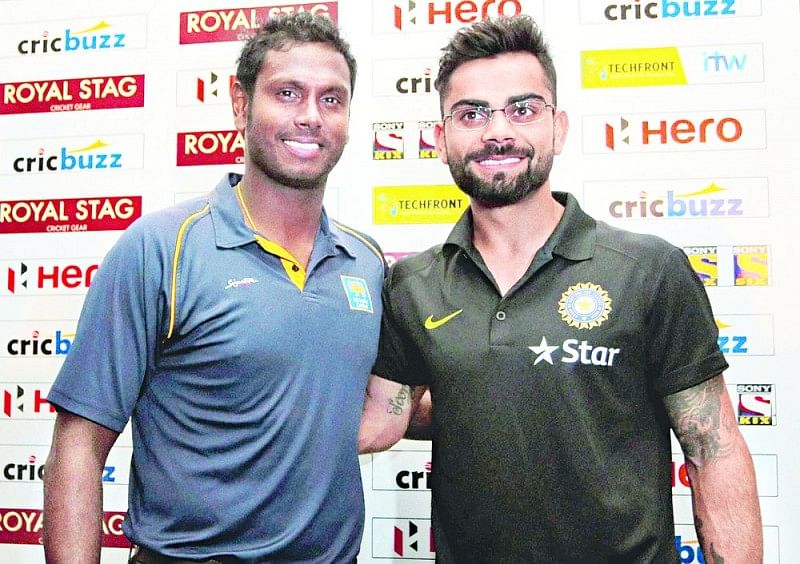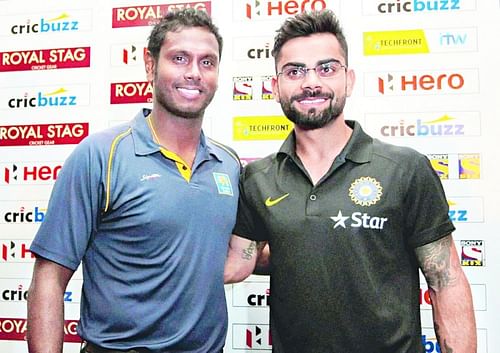
The importance of India vs Sri Lanka 2015

When Virat Kohli and Angelo Mathews walk out for the toss in Galle today, it will mark the commencement of one of the most important series played between India and Sri Lanka in recent times. It’s going to be India’s first full fledged series under Kohli, it’s going to be the first time that his ultra aggressive style of leadership is tested. It’s also going to be the first opportunity for Wriddhiman Saha as India’s premier wicket keeping option; this series is going to decide whether India stick with him or not.
This will be the first series in four years which India start with Harbhajan Singh as their second choice spinner. He has 416 Test wickets. He took his 400th in 2011, was dropped and hardly got a game after that. It’s a proper comeback, this. The stage is set for him. This will be his chance. He’s 35. It will probably be his last one.
There is another Indian spinner who’s making a comeback – Amit Mishra. He’s 32. He averages 43 with the ball in Test cricket. Age is not on his side. Nor is his Test record. He was recalled only due to the failure of India’s other spin options.
Pragyan Ojha, because of his bent arm. Ravindra Jadeja, because of his impinged shoulder. Karn Sharma, because he was thrust into Test Cricket too early. The selectors didn’t deem the younger spinners to be worthy of selection currently. They still are still learning their trade.
The mistake made regarding the rushed selections of Piyush Chawla or Karn Sharma is one they don’t want to repeat. Hence, Amit Mishra is back. There’s a lot riding on this series for him. Another failure, and it may just be the end of his Test career. Much like Harbhajan’s.
What it means for Indian batsmen
This series is of as much importance when it comes to India’s young batting unit. It’s going to be a major learning curve. It’s going to be a test, a test of strength, a test of skill, a test of temperament and a test of character. It’s going to be tough.
For, the conditions will be alien.The temperatures will be high, mind bogglingly high. The humidity, even more so. The wickets, well, the less said the better. The Indians have always struggled here. And that’s pretty evident in the fact that they haven’t won a series here since 1993.
This series will probably give India the batting lineup they will go with for the next couple of years. It’s going to decide who amongst KL Rahul and Shikhar Dhawan accompanies Murali Vijay at the top. It’s going to decide whether Rohit Sharma carries on as India’s number three or Cheteshwar Pujara gets his position back.
It’s going to decide whether or not R Ashwin bats at number six, ahead of Wriddhiman Saha, making him the all rounder India so desperately need. It’s going to decide a lot. There’s just so much importance attached to it.
What it means for Sri Lanka
For Sri Lanka, it will mark the end of an era. It’s Kumar Sangakkara’s last series. With him gone, the last link to the golden age in Sri Lankan cricket will be broken.
It was not just golden, this age, it was much brighter. It began with the sensational, emphatic and unexpected World Cup victory in 1996, and it’s going to end during the course of this series.
Sangakkara is only playing two matches; he has county cricket commitments to honour. He was supposed to retire earlier, he only stayed back because his team mates requested him to. These two matches are like a bonus.
We will get to see a little more of those majestic cover drives, those wristy flicks, those solid back foot punches. We will get to see a little more of that over enthusiastic appealing, that friendly smile, that true sportsman’s spirit, that everything. We will get to see just a little bit more of Kumar Sangakkara.
This golden generation in Sri Lankan cricket produced many triumphs. And it produced many greats, the ones who made these triumphs possible. There was Arjuna Ranatunga, Sanath Jayasuriya, Marvan Attapattu, Chaminda Vaas, Muttiah Muralitharan, Thilan Samaraweera, Mahela Jayawardene. And then there was Kumar Sangakkara.
When these guys were around Sri Lankan cricket seemed in safe hands, there was always their experience to bank on. After Sangakkara goes, there won’t be.
When most other international teams were undergoing periods of transition during the mid to late 2000s, Sri Lanka enjoyed a smooth sailing. Now, it’s their time to deal with change, to overcome obstacles without old hands guiding them through, to play without the assurance, without the luxury of a number three who averages nearly 60 runs per innings.
It’s their time to come to terms with life without Kumar Sangakkara. It’s their time, it’s their turn to do all of it.
What it means for the captains
In some ways, this series is going to be defined by the way Mathews and Kohli lead their teams. This is among India’s first few times without MS Dhoni. This will be Sri Lanka’s first time without Sangakkara, his seemingly endless career just two matches away from ending. Both teams are youthful, their captains young as well, and there’s nothing by way of experience; they are both under transition.
Teams require leaders, more than captains. They require somebody to take that extra responsibility, somebody to shepherd them, somebody to guide them through a transition phase. In this context, the way Kohli and Mathews lead will have a major impact on this series. More than that, it will tell us the direction these sides take in this difficult period. And it will lay the foundation for the new eras in Indian and Sri Lankan cricket – the era of Virat Kohli, the era of Angelo Davis Mathews.
Mathews and Kohli have similar records in Test Cricket. The Sri Lankan is marginally ahead of the Indian, but not by much. However, the way they play the game, the way they bat, and the way they lead couldn’t be more different.
Mathews is cool, calm and composed. Kohli, none of the three. He is aggressive, he is fiery, he’s in your face.
Mathews doesn’t speak much on the field. Kohli can’t seem to stop. Mathews is the wise old man, Kohli, the energetic, full of life teenager. The differences in their characteristics are stark.
When they walk out for the toss tomorrow, all these things will cease to matter. All that matters will be how well they can lead their players, how much they can push them, how much they can get out of them, how much respect their style of leadership can command, and how much they can inspire trust that they can lead the country into its next golden era.
When they walk out for the toss tomorrow, this is all they would want to do. The series means this much. It’s this important for India. It’s this important for Sri Lanka.